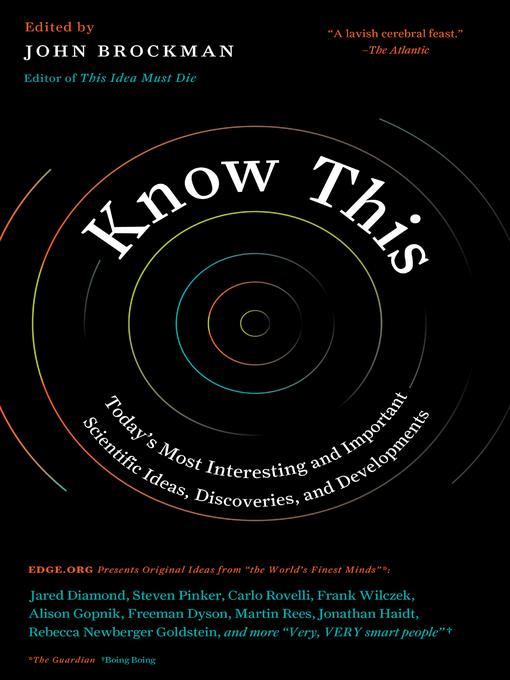
Know This
Today's Most Interesting and Important Scientific Ideas, Discoveries, and Developments
کتاب های مرتبط
- اطلاعات
- نقد و بررسی
- دیدگاه کاربران
نقد و بررسی

December 19, 2016
Brockman follows his critical collection This Idea Must Die with a collection of short essays by various writers that has a more positive outlook on recent scientific developments. Though chapters on
climate change are predictably gloomy, rays of hope appear as futurist Bill Joy and artist James Croak each discuss improvement in batteries; engineer Carl Page outlines the potential of harnessing low energy nuclear reactions; and Leonard Susskind, Andrei Linde, and Stephon Alexander giddily share news from the edges of theoretical physics. The geneticists included relay their concerns with the ethics of gene editing and the debate over “designer children.” In that vein, the biology-focused essays largely address “ethical, moral, and governance challenges.” Computer scientist Marti Hearst lampoons the Big Data fad so prevalent in tech culture. To broaden perspectives, Brockman smartly includes psychologists, economists, sociologists, and linguists along with artists, poets, musicians, and philosophers. As welcome as the social sciences are in a volume such as this, many of the problems addressed demand political, not technological, solutions. Brockman’s array of contributors and subject matter makes for an often lively collection, but with nearly 200 essays, the book could use an organizing principle. Agent: Max Brockman, Brockman Inc.

December 1, 2016
The latest installment of the editor and literary agent's near-yearly anthology of brief essays on a specific scientific theme or subject.Brockman (Life: The Leading Edge of Evolutionary Biology, Genetics, Anthropology, and Environmental Science, 2016, etc.), publisher of the science website Edge.org, poses a question to a few hundred world intellectuals, mostly scientists. Perhaps because he is also a leading literary agent, most dutifully respond, including stars such as Freeman Dyson, Steven Pinker, and Lisa Randall. Here, Brockman reveals 197 delightfully short answers to the question, "what do you consider the most interesting recent scientific news?" Readers of the first dozen will assume the answer is global warming until they realize that Brockman sorts them by topic, and dozens of physicists arrive to air their frustration with dark matter, dark energy, and quantum gravity as well as their disappointment with the great Large Hadron Collider. Other topics include the manipulation of genes, which has become dazzlingly easy; the innumerable planets that orbit distant stars; big data and artificial intelligence, both of which are exploding but not always in a good way. As usual, a minority of the contributors answer a question they'd prefer to answer or merely muse. Weather prediction has quietly become really accurate; the platinum rule (do unto others as they would have you do unto them) is superior to the golden. There are some jolts. An amazing number of published scientific studies can't be reproduced, and cold fusion, long dismissed by the establishment, gets a good word. Among the dozens of well-known contributors are Mario Livio, Lee Smolin, Jared Diamond, A.C. Grayling, Alison Gopnik, and Amanda Gefter. It's difficult to be turgid in a microessay (one paragraph to four, rarely five, pages); a few academics manage, but most deliver lucid intellectual hors d'oeuvres that deserve rereading.
COPYRIGHT(2016) Kirkus Reviews, ALL RIGHTS RESERVED.

























دیدگاه کاربران